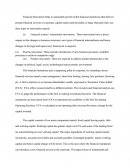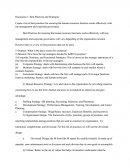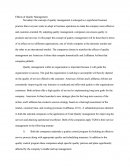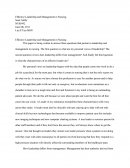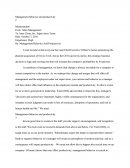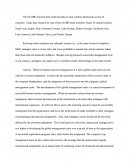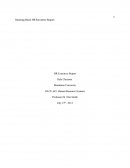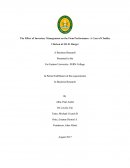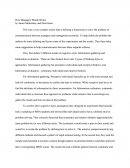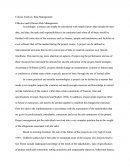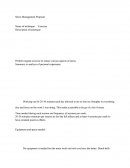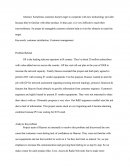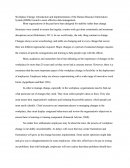The Effect of Working Capital Management on the essays
1,617 The Effect of Working Capital Management on the Essays: 1 - 25 (showing first 1,000 results)
-
A Perspective Study on Financial Innovation in Working Capital Management
Financial Innovation helps in sustainable growth of the financial institutions that delivers prompt financial services to corporate, capital market and the public in large. Basically there are three types of innovations namely (i) Financial system / institutional innovations: These innovations have a direct impact on the changes in business structures, new types of financial intermediaries and hence changes in the legal and supervisory framework is required. (ii) Process innovation: These include introduction of new business
Rating:Essay Length: 300 Words / 2 PagesSubmitted: August 19, 2011 -
A List of Best Practices for Ensuring the Human Resources Function Works Effectively with Top Management and Corporate Governance.
Discussion 1: Best Practices and Strategies Create a list of best practices for ensuring the human resources function works effectively with top management and corporate governance. Best Practices for ensuring the human resource functions works effectively with top management and corporate governance will vary depending on the organization mission. However here is a view of best practices that can be used: 1) Purpose: What is the basic reason for existence? 2) Mission: How have the
Rating:Essay Length: 1,071 Words / 5 PagesSubmitted: April 28, 2012 -
Effects of Quality Management
Effects of Quality Management: Nowadays the concept of quality management is emerged as a significant business practice that everyone wants to adopt in business operations to make the company more effective and customer-oriented. By adopting quality management, companies can ensure quality in products and services. In this paper the concept of quality management will be described in terms of its effect on two different organizations, one of which competes in the domestic market and the
Rating:Essay Length: 762 Words / 4 PagesSubmitted: April 24, 2011 -
Nur 492 - Effective Leadership and Management in Nursing
Effective Leadership and Management in Nursing Sean Ashby NUR/492 June 6th, 2011 Lita P.Tsai MSN Effective Leadership and Management in Nursing This paper is being written to answer three questions that pertain to leadership and management in nursing. The first question is what are my personal views of leadership? The second question is how does leadership differ from management? And finally the third question is what the characteristics of an effective leader are? My personal
Rating:Essay Length: 685 Words / 3 PagesSubmitted: June 9, 2011 -
Human Capital Management - Management Behavior and Productivity
Management behavior and productivity 2 Memorandum From: Sales Management To: Inter Clean, Inc. Supervisory Team Date: October 7, 2010 Importance: High Re: Management Behavior And Productivity I want to believe that everyone has read Chief Executive Officer's memo announcing the planned acquisition of Enviro Tech. Just as the CEO said in his memo, this strategic business decision is huge and exciting one that will increase the company's profitability by 40 percent. As members of management,
Rating:Essay Length: 857 Words / 4 PagesSubmitted: July 17, 2011 -
Effective Human Resource Management
The GLOBE research team analyzed data on nine cultural dimensions across 62 countries. Some later research by one of the GLOBE team members found 10 cultural clusters: South Asia, Anglo, Arab, Germanic Europe, Latin Europe, Eastern Europe, Confucian Asia, Latin America, Sub-Saharan Africa, and Nordic Europe. Knowing which countries are culturally similar (i.e., in the same cluster) is helpful to MNC managers since it is less risky and more profitable to expand into similar cultures
Rating:Essay Length: 336 Words / 2 PagesSubmitted: August 14, 2011 -
Working Capital and Termloans
1. INTRODUCTION This project at Marathon Electric India Limited on Funds Flow Analysis is to know the changes in Flow of Funds over a period of time. This analysis (Funds flow) explains the various sources from which funds are raised and uses to which funds are put. It shows the change in assets and liabilities from the end of one period of time to the end of another period of time (i.e. between two Balance
Rating:Essay Length: 10,378 Words / 42 PagesSubmitted: October 3, 2011 -
Matching Working Capital Policy
Matching Working Capital Policy: if the matching working capital policy takes a balanced approach. It uses both long-term financing as well as short-term financing. The policy attempts to identify permanent and fluctuating current assets. Long-term financing is used for the permanent current assets and short-term financing is used for the fluctuating portion of current assets. Fluctuations are normally caused by seasonal difference in sales but can also be caused by temporary shortages in needed assets(warmah.com).
Rating:Essay Length: 314 Words / 2 PagesSubmitted: June 18, 2012 -
Working Capital Ratios
Working Capital Ratios I] INTRODUCTION Working Capital Ratios provide a quick and relatively simple means of assessing the financial health of a company. By calculating these ratios, it is possible to build up an overall picture of the financial position and performance of a company. This view has been supported by McLaney E. et al, (1990). Using ratios financial statements can be analyzed and interpreted, which is of interest to a vast number of stakeholders
Rating:Essay Length: 1,951 Words / 8 PagesSubmitted: August 19, 2012 -
Capital Management Bangladesh
CAPITAL MANAGEMENT 1. Capital is one of the most important elements of a financial institution. -Capital protects the interests of customers, owners, employees and the general public. - Capital refers to the funds contributed by the owners of a financial institution. In case of a bank, capital is mainly contributed by the stockholders, purchasers of bank's stocks. Another important component is "Annual Earning" which is reinvested in a bank (retained earnings). -Capital and risk closely
Rating:Essay Length: 584 Words / 3 PagesSubmitted: August 23, 2012 -
The Deterrent Effect of Capital Punishment
The Deterrent Effect of Capital Punishment Since 1977 when capital punishment was reinstated by the Supreme Court, the U.S. has executed 1,099 people. There is much dispute about whether or not the death penalty is an effective deterrent of crime and the way the punishment affects the families involved. Some say that capital punishment provides closure for the victims' families and prevent future crimes from occurring. Others are greatly opposed to capital punishment; they say
Rating:Essay Length: 1,678 Words / 7 PagesSubmitted: September 18, 2012 -
Fin 615 - Working Capital
Working Capital FIN615-1204B-03 Colorado Technical University Online December 2, 2012 Susan Weiss Introduction One of the most important steps any organization should consider in regards to their financial well-being is capital budgeting. By utilizing a capital budgeting technique they will be able to determine their financial position before embarking on any investment opportunity. This budgeting technique could be extremely helpful to Superior Living Inc. as it would reduce the chances of misappropriating funds if a
Rating:Essay Length: 894 Words / 4 PagesSubmitted: May 26, 2013 -
In the Work Environment, Managers Will Likely Face Some Ethical Issues
Ethics are the moral values that we hold. They are a result of our upbringing, culture and life experiences. Here are a few thorough explanation of how ethics apply to business: In the work environment, managers will likely face some ethical issues. Some of them include: A. Laying off employees-Removing bread from someone's mouth is something that most managers hate. So, in order to address the issue as carefully as possible with employees, the manager
Rating:Essay Length: 477 Words / 2 PagesSubmitted: March 30, 2016 -
What Is Effective Human Resource Management?
Running Head: HR Executive Report HR Executive Report Dale Chaisson Brandman University OLCU 645: Human Resource Systems Professor Dr. Don Smith July 27th , 2014 What is effective Human Resource Management? What strategies are compiled in order to align this theory with an organization’s long term goals and business initiatives? How do you ensure human resources support the company’s said strategies? In the following report I will attempt to enlighten the reader on human resources
Rating:Essay Length: 628 Words / 3 PagesSubmitted: November 12, 2016 -
Human Capital Management
Related image Indian Institute of Management, Bangalore Assignment on THE WONDEFUL WORLD OF HR AT DISNEY Student Id Student Name Student E-mail Id GMAE0207 Chakrapani Muppala chakrapani.muppala16@iimb.ernet.in 1. How was HR different at Walt Disney when compared to other firms? At Walt Disney HR achieve common values and a strong organizational culture through the recruitment process. Disney HR focuses on values, behavior and beliefs throughout the process of selecting the right candidate. Disney HR does
Rating:Essay Length: 897 Words / 4 PagesSubmitted: January 27, 2017 -
The Effect of Inventory Management on the Firm Performance: A Case of Chubby Chicken & H.I.D. Burger
The Effect of Inventory Management on the Firm Performance: A Case of Chubby Chicken & H.I.D. Burger A Business Research Presented to the Far Eastern University- FERN College In Partial Fulfillment of the requirements In Business Research By Alba, Paul André De Loyola, Jim Enter, Michael Crunch B Ortiz, Erianne Deiniel A. Vendencio, John Albert August 2017 Executive Summary TABLE OF CONTENTS Page Executive Summary 2 UNIT I INTRODUCTION Chapter 1 Background of the Study
Rating:Essay Length: 5,009 Words / 21 PagesSubmitted: August 11, 2017 -
Simulation on Working Capital
Simulation on working capital Through this simulation, I can better understand what managers and CEOs are doing when making decisions for the company. I look through each simulation; look at the impact of decisions on cash flow, sales, and EBIT. The overall effect of these decisions made during the 3 phases led to an increase in all-important working capital areas. Sales increased from $10000 to $21628, increase 116.28%. EBIT increased from $440 million to $1930,
Rating:Essay Length: 619 Words / 3 PagesSubmitted: January 29, 2019 -
How Managers' Minds Work
How Managers' Minds Works by James McKenney and Peter Keen This was a very complex article that is defining a framework to solve the problem of communication between managers and management scientists. To help define the problem the authors do some defining and layout some of the experiments and the results. They then make some suggestions to help communication between these separate cultures. They first define 2 different modes of cognitive style; Information gathering
Rating:Essay Length: 1,229 Words / 5 PagesSubmitted: February 24, 2011 -
Critical Analysis: Effective and Efficient Risk Management
Critical Analysis: Risk Management Effective and Efficient Risk Management Accordingly, a project can simply be considered with simple factors that include the start date, end date, the tasks and responsibilities to be conducted and when all of these would be finished with some idea of the resources such as finance, people and machineries and facilities or even software that will be needed during the project course. A project can be defined as interconnected activities that
Rating:Essay Length: 3,040 Words / 13 PagesSubmitted: April 26, 2011 -
Stress Effects and Management Report - Self Analysis
Stress Management Proposal Name of technique: Exercise Description of technique: Perform regular exercise to reduce various aspects of stress. Summary or analysis of personal experience: Working out for 20-30 minutes each day allowed to me to lose my thoughts in everything else and focus on the work I was doing. This made it possible to let go of a lot of stress. Time needed during each session and frequency of sessions per week: 20-30 minutes
Rating:Essay Length: 325 Words / 2 PagesSubmitted: May 23, 2011 -
Customer Management & Satisfaction Help to Achieve the Acceptance of Work
Abstract: Sometimes customer doesn't eager to cooperate with new techonology provider because they're familiar with other product. In that case, it is very difficult to reach their trusworthiness. So proper & managable customer relation help to over this obstacle to reach the target. Keywords: customer satisfaction, Customer management Problem Behind GP is the leading telecom operators in B country. They've about 20 million subscribers with value added service across the country. GP has vast roll-out
Rating:Essay Length: 1,372 Words / 6 PagesSubmitted: August 5, 2011 -
Efficiency and Effectiveness in Management
Efficiency and effectiveness are both commonly used management terms. Yet, while they sound similar and start with the same letters, they both mean different things. Efficiency refers to doing things in a right manner. Scientifically, it is defined as the output to input ratio and focuses on getting the maximum output with minimum resources. Effectiveness, on the other hand, refers to doing the right things. It constantly measures if the actual output meets the desired
Rating:Essay Length: 399 Words / 2 PagesSubmitted: August 12, 2011 -
To Propose, Plan and Present a Complete Outline of an Effective Business Plan Developed by a Young Entrepreneur to Raise Capital for a Proposed Venture.
BUSINESS PLAN ELEGANT CRYSTAL SDN. BHD. CONTENTS I.0 EXECUTIVE SUMMARY 2.0 THE NATURE OF ECSB BUSINESS 2.1 Position to Date 2.2 Mission Statement 2.3 Short-term Objectives 2.4 Long-term Objectives 2.5 Key Personnel 2.6 Legal Structure 2.7 Professional Advisers 3.0 PRODUCTS AND SERVICES 3.1 How We Operate 3.2 SNSB's Unique Selling Matrix 3.3 Sales Materials and Special Offers 3.4 Retailing and Supplying 4.0 THE MARKET AND THE COMPETITION 4.1 Our Target Market 4.2 Market Positioning 4.3
Rating:Essay Length: 5,457 Words / 22 PagesSubmitted: August 13, 2011 -
Workplace Change - Introduction and Implementation of the Human Resource Information System (hris) Towards a More Effective Data Management
Workplace Change: Introduction and Implementation of the Human Resource Information System (HRIS) towards a more effective data management Most organizations in the past have been designed for stability rather than change. Structures were created to ensure that regular, routine work got done consistently and minimum disruptions occur (Rubinstein, 2011). In our world today, the only thing constant is change. Changes always occur as technology and skills are changing and in every change that occurs there
Rating:Essay Length: 2,935 Words / 12 PagesSubmitted: August 14, 2011 -
Discuss Why Understanding 'surface-Level Diversity' and 'deep-Level Diversity' Is Good Business Practice for Managers Working in Organisations
Introduction The different kinds of diversity in organizational settings refer to the two selected diversity levels that are posed as challenges in the workforce, be it a positive impact or negative impact. These 2 major types are surface-level diversity and deep-level diversity. They are notable in today's labor force and the importance of them may be well addressed in certain organizations. Surface-level diversity refers to the noticeable and heterogeneous characteristics such as age, gender, ethnicity,
Rating:Essay Length: 1,837 Words / 8 PagesSubmitted: September 7, 2011
